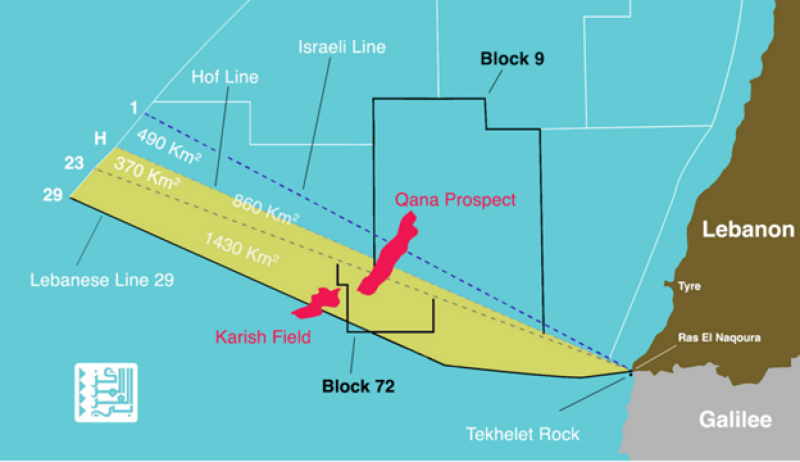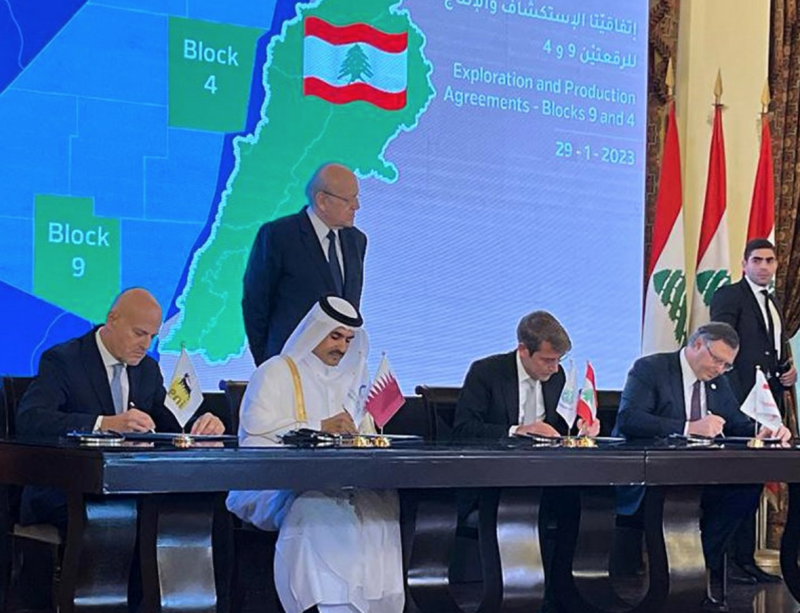QatarEnergy is continuing to build its portfolio in the Eastern Mediterranean with its acquisition of a 30% working interest in exploration and production agreements pertaining to Blocks 4 and 9 offshore Lebanon; a move that might also enable the State of Qatar to help reduce regional political tensions.
Farm-in agreements signed on 29 January in Beirut transfer to QatarEnergy the 20% stake vacated by Russia’s Novatek in September plus another 5% each from shares held by Italy’s Eni and France’s TotalEnergies. The transaction leaves Qatar with 30% while Total and Eni split the remaining stake at 35% each.
Project operator TotalEnergies said it will begin drilling in Q3 2023 on Block 9. Though the partners drilled only a dry hole on Block 4 in 2020, Israeli discoveries across the maritime border suggest a geology that could make a difference on Block 9.
Location, Location: East Med’s the Place for Buyers West and East
QatarEnergy has been steadily raising its profile in the East Med which can supply European demand for LNG and natural gas in the short term, and beyond 2030—when Europe says it will no longer need gas—to Asia via the Suez Canal.
QatarEnergy is exploring two blocks offshore Cyprus with ExxonMobil where in March a well drilled by the consortium on Block 10 reaffirmed the government’s earlier estimate of 5.0 to 8.0 Tcf in gas reserves. The following month, QatarEnergy acquired a 40% working interest in ExxonMobil’s North Marakia exploration block in Egypt’s deepwater offshore.
The Arab company’s entry into Lebanon’s sector of the East Med expands not only its acreage but also its ties with TotalEnergies, bringing to nine the number of countries in which the French-Arab tandem have exploration partnerships, according to TotalEnergies.
Lebanon’s Block 9 has a total area of 1749 km2 and lies about 80 km off the coast of southern Lebanon in water depths of approximately 1700 m, while Block 4 has a total area of 1911 km2 and is located in water depths of about 1500 m.
After signing the farm-in agreement in January, Qatar’s Energy Minister and CEO of QatarEnergy, Saad Sherida Al-Kaabi, was quoted as saying the “commitment gives us the opportunity to support Lebanon’s economic development … and I want to assure our brothers in Lebanon that … the State of Qatar will always be there in support of a better future for Lebanon and its people.”
Qatar Lands Role as Mediator in Derisking Regional Tensions
One week later, on 6 February, the State of Qatar attended a meeting in Paris with counterparts from France, the US, Saudi Arabia, and Egypt to discuss how regional powers could cooperate in helping Lebanon emerge from a political and economic crisis that dates back decades.
Mark Daou, a member of the Lebanese parliament and a lecturer at American University in Beirut, called the it “a major event” in an interview 2 days before the Paris meeting with the Atlantic Council, a Washington, DC think tank.
“The Europeans are the heaviest investors in Lebanon … the French have followed up with IMF reform; the US delivered the maritime (border) deal,” he said. “The main weakness in regional dynamics is that there is an imbalance between French and US involvement (on one side) and Arab involvement.
Qatar represents a moderate influence that could “get some movement on electing a president … and forming an executive branch” of government,” in Lebanon, said Daou.
Lebanon has been without an executive branch since interim President Michel Aoun left office on 31 October after having signed off on the US brokered deal to settle Lebanon’s maritime border dispute with Israel, an agreement which derisked and jump-started TotalEnergies’ and Eni’s exploration plans.
As TotalEnergies CEO Patrick Pouyanné said at the signing ceremony in January with QatarEnergy, delineating Lebanon’s maritime border with Israel “has created a new momentum for the exploration of its hydrocarbon potential. Along with our partners, we are committed to drilling as soon as possible in 2023 an exploration well in Block 9, and our teams are mobilized to conduct these operations.”
Meanwhile, Israel’s Energy Ministry is moving ahead with its own exploration plans, offering 20 new exploration blocks in a fourth Offshore Bid Round with total acreage spanning 5888 km2 across four zones (E, G, H, I) within the Israeli Economic Zone. Bidders have until July 2023 to submit proposals.



